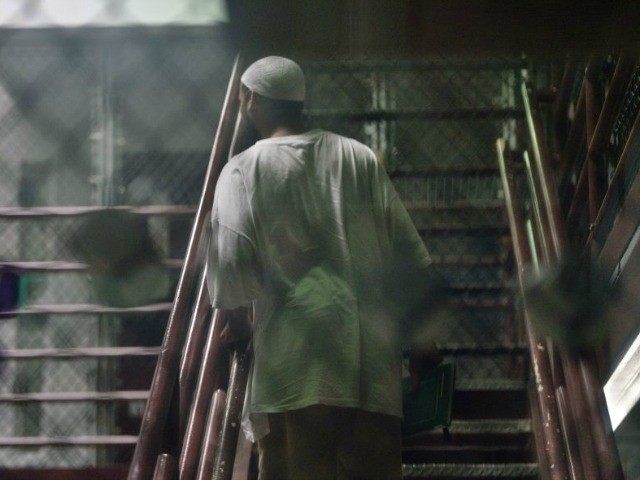The Obama administration announced Saturday that four Afghan detainees had been transferred from the U.S. military prison in Guantánamo Bay, Cuba, to their home country.
U.S. officials have characterized the move as a sign of good will between Kabul, the Afghan capital, and Washington.
New Afghan President Ashraf Ghani requested the transfer of the four detainees who had already been cleared for release by a review board created by Obama upon taking office in 2009.
The United States did not request that the Afghan government further detain the released men. An unnamed Obama administration official told The New York Times that the individuals are unlikely to face further detainment in Afghanistan.
Under law, the defense secretary has to approve the release of Guantánamo Bay detainees.
Although the four Afghans were cleared for transfer, Defense Secretary Chuck Hagel did not immediately sign off after Gen. John Campbell, the top commander of U.S. and NATO forces in Afghanistan, raised concerns that they could pose a danger to troops in the country.
In a statement released Saturday, the Pentagon noted that “over 90 percent of the Guantánamo detainees transferred during this administration are neither confirmed nor even suspected of having re-engaged in any terrorist or other hostile activity.”
Obama administration officials, who spoke on a condition of anonymity because they were not permitted to publicly discuss the matter, told the Associated Press that Gen. Campbell and other military leaders on the ground “have now screened” the transfer of the four Afghans.
One administration official told the AP that “most, if not all, the terrorism accusations against the men had been discarded and each is considered a low-level operative at best.”
In November, The Long War Journal reported that Abdul Rahim Muslim Dost, who was detained at Guantánamo for three years before he was released, is “leading an effort to recruit jihadists for the Islamic State” in Afghanistan and Pakistan.
The recent transfer brings the Guantánamo detainee population down to 132, including eight Afghan nationals.
According to Afghanistan’s High Peace Council, a government-appointed entity, the four men “will be reunited soon with their families.” The council has requested the repatriation of the eight Afghans who remain at Guantánamo.
On Saturday, the Department of Defense (DoD) identified the men as Shawali Khan, Khi Ali Gul, Abdul Ghani, and Mohammed Zahir.
The U.S. Embassy in Kabul said in a statement:
We have full confidence in the Afghan government’s ability to mitigate any threats these individuals may pose and to ensure that they are given humane treatment. … It demonstrates Afghan sovereignty and U.S. trust in the strength of Afghan government institutions.
The embassy acknowledged that the recent transfer brings Obama closer to meeting his 2009 pledge of closing the prison.
“The United States is grateful to the Government of the Islamic Republic of Afghanistan for its willingness to support ongoing U.S. efforts to close the Guantánamo Bay detention facility,” stated the Pentagon. “The United States coordinated with the Government of the Islamic Republic of Afghanistan to ensure these transfers took place consistent with appropriate security and humane treatment measures.”
Obama administration officials told the AP more transfers are expected to occur in the next few weeks.
As required by law, Secretary Hagel provided Congress with classified notification of the transfer.
The chairman of the House Armed Services Committee expressed objections to the move, saying it was “completely irresponsible.”
“Clearly the safety of our troops still serving in Afghanistan could not have been a consideration in this decision,” added Chairman Howard “Buck” McKeon (R-CA) in a statement on Saturday.
Congress prohibits the transfer of Guantánamo detainees to the U.S. for any reason.
On Friday, Obama issued a statement condemning congressional restrictions on closing the Guantánamo Bay prison.
Obama acknowledged that the U.S. ended its operations of military prisons in Afghanistan by releasing the final three detainees from the Bagram airbase facility in Parwan province.
“Yet halfway around the world, the detention facility at Guantánamo Bay, Cuba, remains open for the 13th consecutive year, costing the American people hundreds of millions of dollars each year and undermining America’s standing in the world,” Obama said, adding, “The continued operation of this detention facility weakens our national security by draining resources, damaging our relationships with key allies and partners, and emboldening violent extremists.”
Delays by outgoing Pentagon chief Hagel in signing off on Guantánamo Bay transfers “contributed to tensions between the exiting Pentagon chief and the White House, particularly with National Security Adviser Susan Rice,” notes The New York Times.
“But Mr. Hagel, who resigned under pressure last month, has maintained all year that he would not be rushed into releasing prisoners,” the article adds.
The Associated Press contributed to this article.

COMMENTS
Please let us know if you're having issues with commenting.